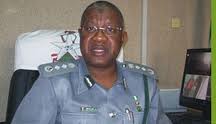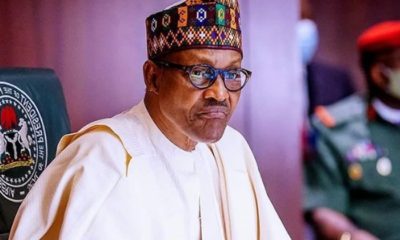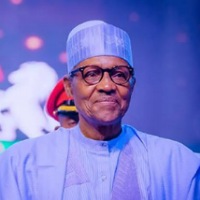Finance
Nigeria Customs Boss, Abdullahi Dikko resigns

ABUJA-Comptroller-General of the Nigeria Customs Service, Alhaji Dikko Abdullahi has voluntarily resigned from government service. President Muhammadu Buhari accepted his resignation on Monday.
The retirement will commence on Tuesday. Dikko’s resignation had been conveyed to the president earlier in a letter dated 3rd August. Buhari’s approval of Dikko’s request was dated 14th August in an acceptance signed on 14th August.
Buhari thanked the NCS boss for his services to the county in the last six years. The president wrote in the approval letter titled Voluntary retirement from the Nigeria Customs Service: “Dear, Alhaji D.I. Abdullahi. I write to acknowledge the receipt of your letter Ref. No. NCS/ADM/HQ/P. 35802 of 3rd August, 2015 conveying your decision to voluntarily retire from the Nigeria Customs Service with effect from Tuesday, 18th August, 2015.
 “I note with appreciation your services to this nation, especially as the Comptroller-General of the Nigeria Customs Service in the last six (6) years.
“I note with appreciation your services to this nation, especially as the Comptroller-General of the Nigeria Customs Service in the last six (6) years.
“Accordingly, I hereby approve your voluntary retirement from the Nigeria Customs Service with effect from 18th August 2015. “I wish you the very best in your future endeavours. “Yours sincerely, Muhammadu Buhari.”
Dikko said the reason for his resignation was to allow younger people to come into leadership and add fresh ideas.
In the resignation letter, Dikko had thanked Buhari for allowing him serve in his administration since 29th May. He recalled that on assumption of office, he articulated six-point agenda which he vigorously pursued.
He said the agenda had positively impacted on the efficiency and performance of officers of the service and had drastically changed the negative perception of the service.
He listed the six-point agenda to include capacity building, introduction of e-Customs, enhancing productivity through improved welfare package, moral rebirth for discipline and integrity in service, collaboration and partnering with stakeholders and international organisations, as well as fostering understanding of the Service in the eye of the general public using an intensified and a well-coordinated public relations platform.
The NCS boss said under his watch, the revenue collection into various coffers of government increased drastically.
He said the Service’s average monthly collection in 2009 when he took over was about N29billion, adding that the average monthly collection is currently between N90billion and N100billion.
“While thanking Your Excellency and indeed Nigerians for the opportunity to serve and contribute my quota to the development of our fatherland, I wish to seek approval of Your Excellency to be allowed to retire voluntarily on 18th August 2015,” he said.
“This decision is taken with a view to allowing young bloods takeover the mantle of leadership of the Service in order to sustain and improve on my legacy.”
Business
Nigeria pays US$4.9 billion on petrol subsidy in 2024- NNPCL
It was however noted by Biztellers.com.ng, that although subsidy is back in effect, the main reason for that is the increasingly weak state of the Naira and the country’s extreme dependence on products importation. Also unlike the previous subsidy era, where several oil marketers were getting free subsidy refunds for unverified product importation, this subsidy era is witnessing only one importer, the NNPCL, which in effect is the sole receiver of government subsidies.
Yemie ADEOYE
INSPITE of the official position of the Nigerian government that the controversial petrol subsidy is gone for good as announced by the President on assumption of office, the state owned Nigerian National Petroleum Corporation Limited, NNPCL has disclosed that petrol subsidy is still fully operational in Nigeria, although, under a different identity.
Umar Ajiya, Chief Financial Officer at the NNPCL, disclosed that it cost the company a staggering N7.8 trillion (US$4.9) to cover this price gap in the first seven months of 2024.
Rather than simply referring to these claims as subsidies, he stated that the company is merely managing the price difference in petrol imports on behalf of the federation, stressing that this should not be misconstrued as a return to subsidy payments.
![]() This revelation has reignited discussions on whether the NNPC is indirectly offering subsidies, a concept typically defined as selling a product below its cost price.
This revelation has reignited discussions on whether the NNPC is indirectly offering subsidies, a concept typically defined as selling a product below its cost price.
Documents reviewed by Biztellers.com.ng showed that the term “subsidy” was used extensively in official correspondence between the NNPCL and the presidency, particularly in reference to the “shortfall.”
Recall that President Bola Tinubu reportedly approved NNPC’s request to utilize the 2023 final dividends due to the federation to offset these costs.
However, during a media briefing on Monday about the company’s 2023 audited financial statements, Ajiya refuted claims that the NNPC is involved in any subsidy scheme.
Ajiya further disclosed that the Nigerian government owes the NNPC N7.8 trillion ($4.9 billion) in subsidy-related debts for the period from January to July 2024.
In furtherance of his clarification to the News Agency of Nigeria (NAN), Ajiya insisted that no subsidy payments have been made to any marketer in the last nine years, citing the NNPC’s role as the sole importer of petrol under supply contracts.
He said, “In the last eight to nine years, NNPC Ltd. has not paid anyone a dime as a subsidy; no kobo has been disbursed by NNPC Ltd. in the name of subsidy. No marketer has received any payment from us for subsidy.”
“What has been happening is that we have been importing PMS, which has been landing at a specific cost price, and the government tells us to sell it at half price. So the difference between the landing price and that half price is a shortfall.
“And the deal is between the Federation and NNPC Ltd., to reconcile, sometimes they give us money, so there is no money exchanging hands with any marketer in the name of subsidy.”
Ajiya remained silent on how much of the $4.9 billion could have been remitted to the federation account if the NNPC had not been covering the “shortfall.”
It was however noted by Biztellers.com.ng, that although subsidy is back in effect, the main reason for that is the increasingly weak state of the Naira and the country’s extreme dependence on products importation. Also unlike the previous subsidy era, where several oil marketers were getting free subsidy refunds for unverified product importation, this subsidy era is witnessing only one importer, the NNPCL, which in effect is the sole receiver of government subsidies.
Banking
CBN Denies Currency Devaluation

The Central Bank of Nigeria (CBN) has refuted claims of devaluing the.
Earlier reports suggested that the CBN had devalued the Naira, lowering its exchange rate from N631 to the dollar, compared to the previous day’s rate of N461.60 at the Importers and Exporters (I&E) window.
However, the Central Bank of Nigeria (CBN) released a statement on Thursday through its Acting Head of Corporate Communications, Dr. Isa Abdulmumin, categorizing the report as false information.
In the statement titled ‘CBN Has Not Devalued The Naira’, he said the attention of the apex bank was drawn to the news report by an Abuja based newspaper edition of June 1, 2023, titled “CB Devalues Naira To 630/51”.
However, the CBN stated categorically that the news report was replete with outright FALSEHOODS and destabilizing innuendos, ‘reflecting potentially willful ignorance of the said medium as to the workings of the Nigerian Foreign Exchange Market.’
“For the avoidance of doubt, the exchange rate at the Investors’ & Exporters (I&E) window traded this morning (June 1, 2023) at N465/USS1 and has been stable around this rate for a while.
“The public is hereby advised to ignore the news report by Daily Trust in its entirety, as it is speculative and calculated at causing panic in the market,” the CBN spokesman added.
He, therefore, advised media practitioners to verify their facts from the Central Bank of Nigeria before publishing in order not to misinform the public.
Banking
BREAKING: CBN Increases Interest Rate By 0.5%

The interest rate in Nigeria has been raised to 18.5 percent, up by 0.5 percent, from 18 percent where it was pegged in March 2023.
The Central Banks of Nigeria’s (CBN) Monetary Policy Committee (MPC) resolved to this effect at its third meeting of 2023 in Abuja, on Wednesday.
Governor, CBN, Godwin Emefiele, made the disclosure in the communiqué of the MPC’s meeting, thereafter.
While engaging the media at the end of the two-day meeting, Emefiele, said the committee voted to keep the asymmetric corridor at +100 and -700 basis points around the MPR.
In the view of the MPC, rising inflation rate is traceable to the high energy cost and challenges around the supply chain, among others, which lie outside the corridors of the CBN.
Emefiele said, “The current trend in price development would continue to be monitored by the bank with greater collaboration with fiscal authority to address the drivers of inflation.”
Biztellers reports that the CBN had effected six consecutive interest rate increases, which has seen the rate move from 11.5 percent in March 2022 to 18.5 percent in May 2023.



















